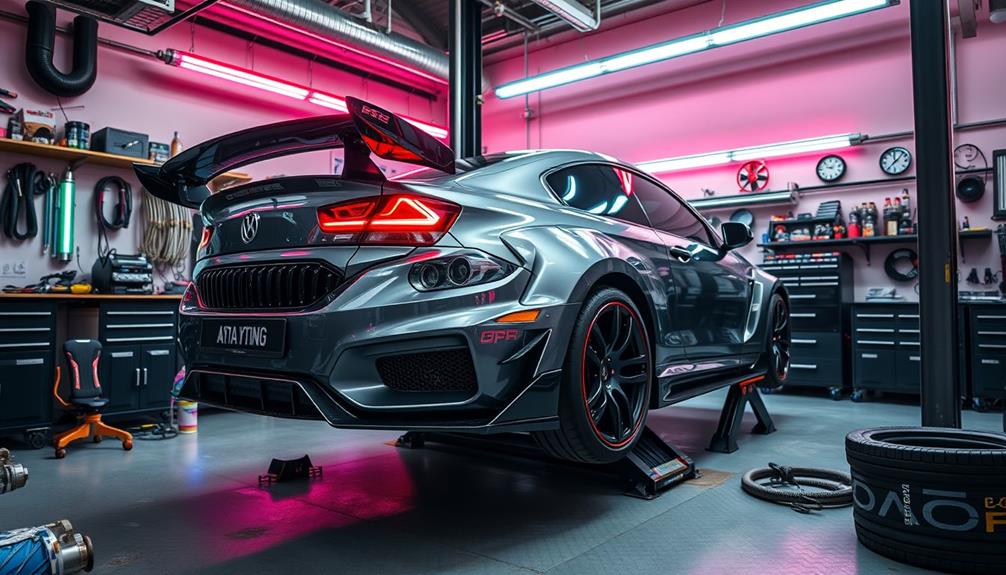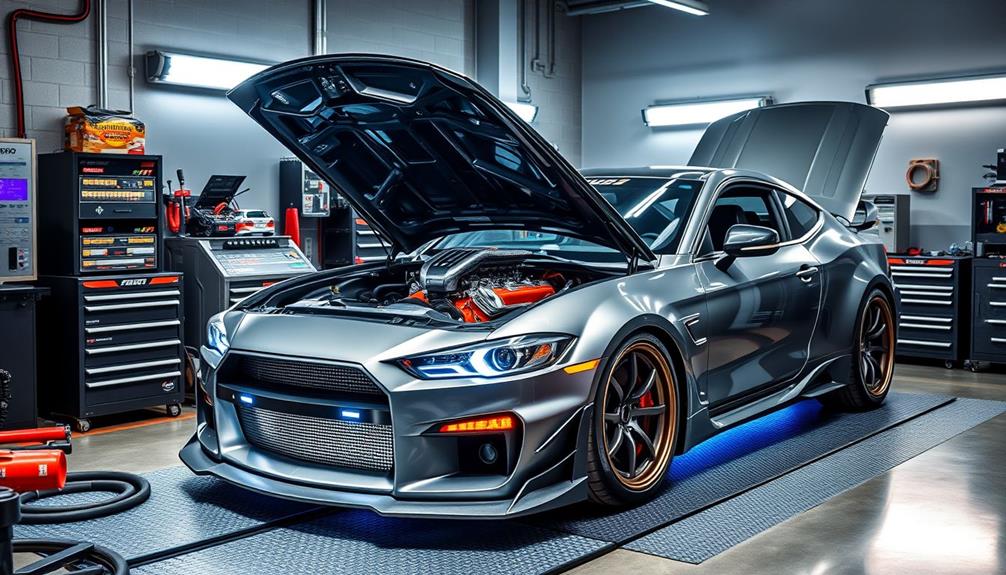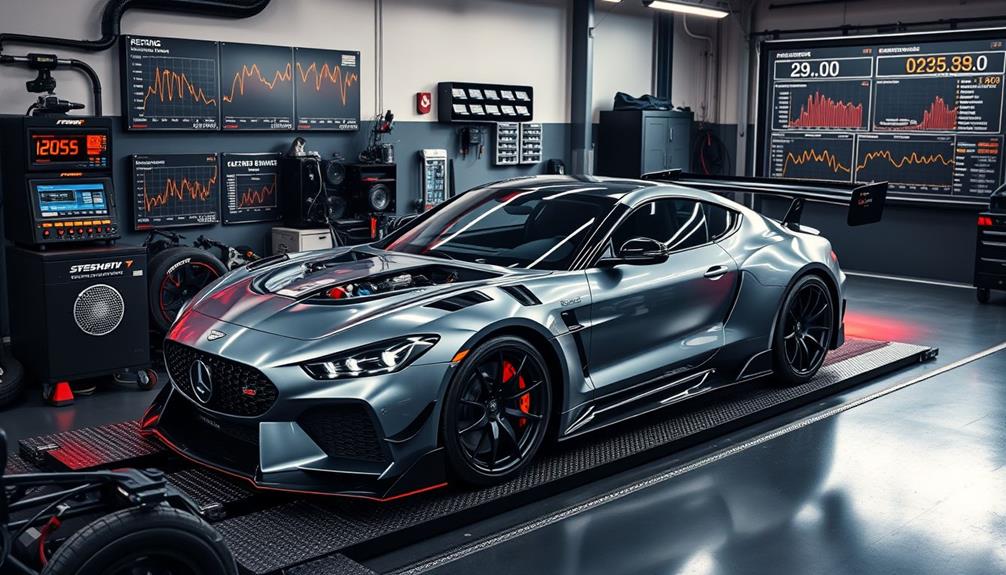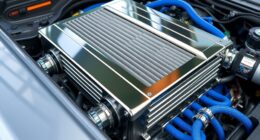Car tuning costs in Singapore can vary considerably based on the type and complexity of services you choose. Basic chip tuning starts around S$500, while stage 1 tuning generally ranges from S$700 to S$1,000, boosting horsepower by 15-40 HP. If you're considering dyno tuning for precise adjustments, expect to pay between S$300 to S$800. Additional modifications, like exhaust upgrades, can push costs over S$2,000. Location and vehicle type also impact pricing. For a clearer picture of your options and expenses, you'll want to check out the variety of tuning methods and services available.
Key Takeaways
- Basic chip tuning starts at S$500, while Stage 1 tuning ranges from S$700 to S$1,000, offering significant performance gains.
- Dyno tuning costs between S$300 and S$800, with retuning fees of S$200 to S$500 for accurate performance assessment.
- Additional performance modifications can increase costs significantly, ranging from S$800 to over S$2,000 depending on the extent of changes.
- Prices vary based on factors like vehicle make, tuning method, and complexity of engine management systems.
- Labor costs for tuning services typically range from S$100 to S$200 per hour, influencing overall expenses.
Overview of Tuning Costs
When considering car tuning in Singapore, you'll find that costs can start at around S$500 for basic chip tuning. Additionally, more advanced tuning options, such as engine modification and performance upgrades, can range from S$1,000 to S$5,000 or more. These options can significantly improve your car’s power and overall performance. If you are looking to modernize your classic pickup, there are also various options for modern upgrades for your classic pickup to enhance its power, fuel efficiency, and overall functionality.
If you're looking for something more advanced, Stage 1 tuning, which is ideal for stock cars, typically ranges from S$700 to S$1,000. The price depends on the tuning method you choose and the provider you select.
For those aiming to optimize engine performance, dyno tuning is another option, costing between S$300 to S$800.
If you decide to include additional ECU tuning, be prepared to add another S$200 to S$500 to your total bill.
Performance tuning can vary widely based on factors like your vehicle's make and model, the complexity of its engine management system, and the tuning shop's reputation.
It's essential to note that if you want to maximize your gains, additional modifications—such as upgrading your air intake or exhaust systems—might be necessary.
While they can increase your overall tuning costs, they often lead to more significant performance improvements.
Factors Influencing Price
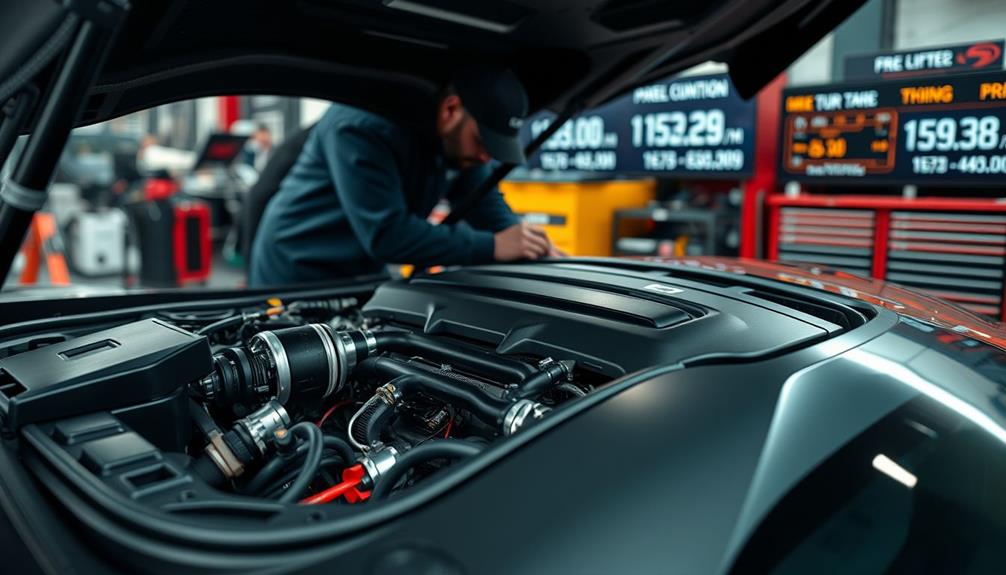
When you consider car tuning, the method you choose can notably impact the price.
Different vehicles also come with their own unique challenges, and that variability can affect your overall cost.
Understanding these factors will help you make an informed decision.
Tuning Method Impact
Often, the method you choose for car tuning greatly impacts the overall cost. For instance, ECU tuning can range from $400 to $1200, depending on whether you opt for an open-source method or a piggyback ECU installation.
If you're looking for a more customized approach, dyno tuning typically costs between $300 and $800, with potential retuning expenses of $200 to $500 afterward. The complexity of your vehicle's engine management system also plays a crucial role in determining these costs.
When you decide on a tuning method, consider the type of dyno used, whether it's inertia or load-bearing, as this can further influence pricing. Urban areas often charge more for tuning services due to higher demand and overhead costs, so keep your location in mind.
Also, performance modifications that go beyond standard tuning can quickly add up, especially if you're installing a piggyback ECU, which can increase your total expenses by $800 to $1200.
Ultimately, the tuning method you select will profoundly shape your car tuning experience and budget.
Vehicle Make Variability
The variability in vehicle make and model greatly shapes car tuning costs. When you're considering tuning, it's vital to understand how different factors influence pricing. For instance, specialized or high-performance vehicles often come with higher tuning fees due to the modifications needed to enhance their power.
Here are some key aspects that contribute to vehicle make variability:
- Type of vehicle: Sports cars usually require more expensive tuning than sedans.
- Modifications needed: Upgrades like exhaust systems and air intakes can increase costs considerably.
- Location: Tuning services in urban areas often charge more compared to rural locations.
- Shop reputation: Established tuning shops with a solid track record may have premium pricing for their expertise.
When it comes to tuning for diesel vehicles, expect additional costs for specific modifications that cater to diesel performance.
Custom tuning services tailored to your vehicle's unique setup will also be pricier than standard options. Understanding these factors will help you budget more effectively for your car tuning experience.
Types of Tuning Services

What types of tuning services can you choose from in Singapore? There's a variety of options tailored to enhance your vehicle's performance, efficiency, and overall driving experience. Here's a quick overview of some popular tuning services available:
| Tuning Service | Description |
|---|---|
| Chip Tuning | Packages start around S$500, boosting power and torque by up to 30%. |
| Stage 1 Tuning | Ideal for stock cars, costing between $700-$1,000, adding 15-40 horsepower. |
| Dyno Tuning | Optimizes engine performance, costing $300-$800, plus ECU retuning fees. |
| Fuel Efficiency Tuning | Enhances fuel consumption, available as an additional service. |
| Customized Remapping | Tailored tuning based on engine upgrades, with costs varying by complexity. |
Each of these services can greatly impact your vehicle's performance and efficiency. Chip tuning, for instance, can provide substantial boosts in power and torque, while fuel efficiency tuning can help save on gas. By understanding these options, you can make informed decisions about how to enhance your car's performance according to your needs.
Typical Price Ranges
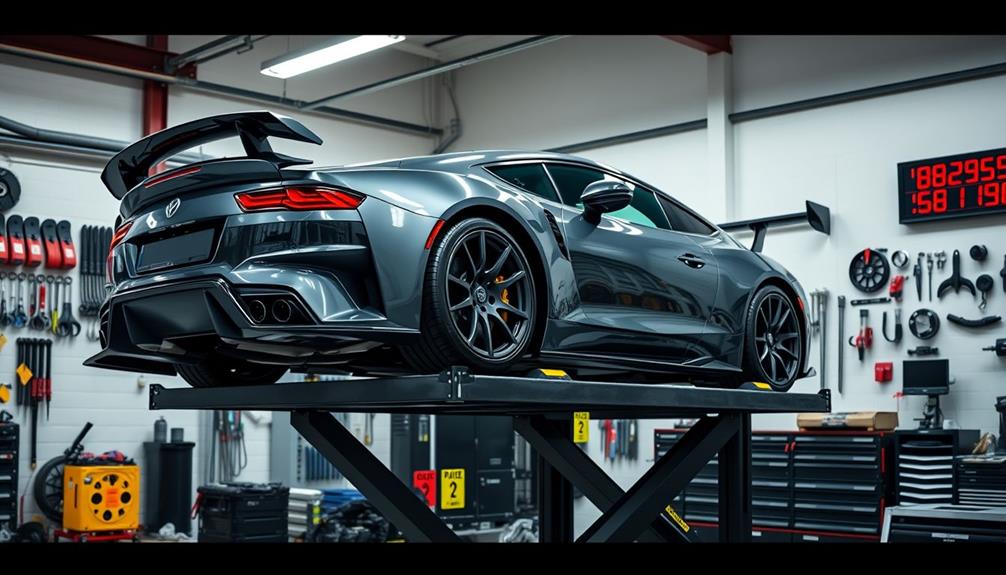
When considering car tuning services in Singapore, understanding typical price ranges is essential for budgeting and making informed decisions. The costs can vary widely depending on the type of tuning and your vehicle's specifics.
Here's a breakdown of what you might expect:
- Dyno tuning: $300 to $800, with ECU retuning adding another $200 to $500.
- Opensource tuning: $400 to $1200, while Ecutek tuning typically exceeds $1000.
- Piggyback ECU installation: Generally costs between $800 and $1200.
- Custom tuning: Often costs more than off-the-shelf maps due to the personalization involved.
Keep in mind that these price ranges can fluctuate based on factors like your vehicle's make and model, as well as the geographic location of the tuning shop.
Urban areas usually have higher prices. Additionally, the reputation and experience of the tuning shop play a significant role in determining the final costs.
Additional Modification Expenses
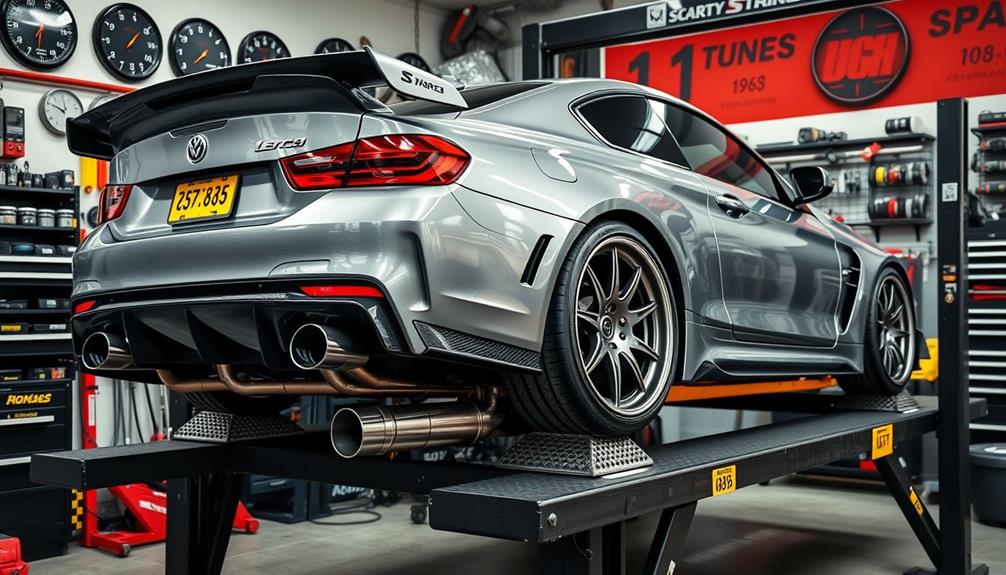
Budgeting for car tuning in Singapore often requires factoring in additional modification expenses that can enhance your vehicle's performance. These expenses can vary widely, depending on the specific parts you choose.
For instance, upgrading your exhaust and air intake systems usually costs between $300 and $1,500, while installing a GFB DV+ diverter valve to boost performance might set you back an additional $150 to $300.
If you're considering extensive modifications, the costs can quickly add up, potentially exceeding $2,000. Performance parts like downpipes and intercoolers are another area where you may spend considerably, with prices typically ranging from $500 to $2,000, depending on their quality and brand.
Don't forget about labor costs when planning your budget; installation of aftermarket parts generally costs between $100 and $200 per hour.
Comparison of Tuning Methods
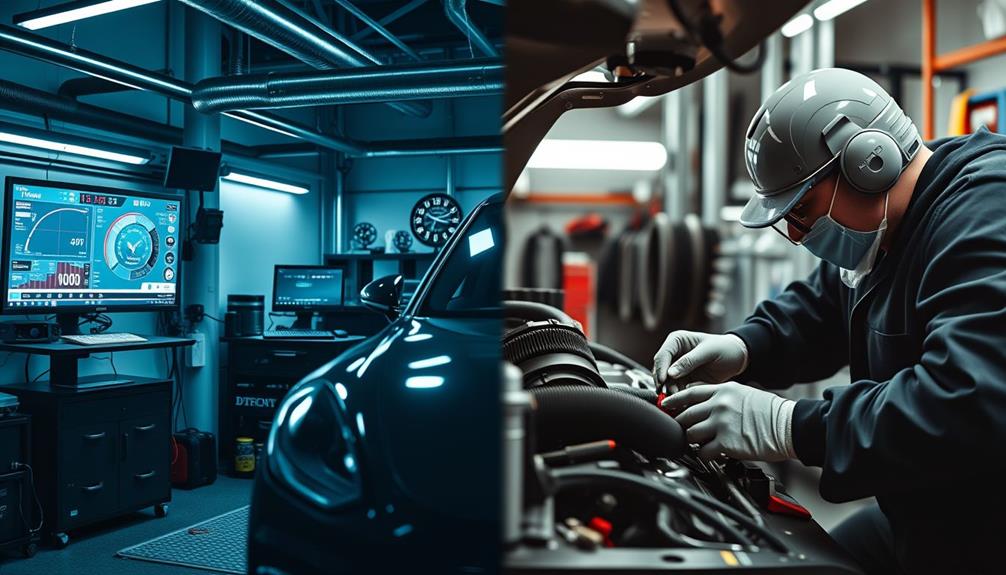
When considering tuning methods, you'll find significant differences in costs and performance gains.
Each approach, from ECU tuning to dyno adjustments, impacts your car's power and efficiency in unique ways.
Let's break down these variations so you can choose the best option for your vehicle.
Tuning Method Differences
Car tuning methods vary considerably, each offering unique advantages and price points. When considering your options, it's crucial to understand the differences among them to make an informed decision that suits your needs.
- Flash Tuning: This ECU tuning method rewrites your engine control unit's software for optimized performance. It typically offers smoother operation and better efficiency.
- Piggyback Systems: These act as intermediaries, enhancing your vehicle's performance without rewriting the ECU. However, they may not deliver the same level of efficiency as flash tuning.
- Dyno Tuning: This method allows for precise adjustments based on real-time performance data. It can enhance horsepower and torque, but it often comes at a higher price.
- Stage 1 Tuning: This involves remapping the ECU and generally costs between $700 and $1,000. It's a popular choice for a noticeable performance boost.
Your choice among these tuning methods should depend on your vehicle type and performance goals. Each method has its own set of benefits, and understanding them will help you maximize your car's potential effectively.
Cost Variations Explained
Understanding the cost variations among different tuning methods is essential for making an informed decision. You'll find that pricing can fluctuate considerably based on the method you choose, as well as the specific requirements of your vehicle.
Here's a breakdown of some common tuning methods and their associated costs:
| Tuning Method | Price Range (S$) | Notes |
|---|---|---|
| Dyno Tuning | 300 – 800 | Depends on vehicle complexity |
| ECU Retuning | 400 – 1,200 | Opensource tuning is generally cheaper |
| Chip Tuning Modules | Starting at 500 | Enhances performance and fuel efficiency |
| Piggyback ECU Installation | 800 – 1,200 | Customization impacts price |
| Detailed Tuning Package | Varies greatly | Includes performance upgrades and more |
When considering installation with original automotive components, the complexity of your chosen method will heavily influence the final cost. This variability highlights the importance of researching and understanding which tuning method aligns best with your goals and budget. By doing so, you can make sure you're investing wisely in your vehicle's performance upgrades.
Performance Gains Overview
Different tuning methods offer varying performance gains that can greatly influence your driving experience. Understanding these differences helps you make informed decisions when choosing the best option for your vehicle. Here's a quick overview of what you can expect:
- Stage 1 Tuning: Typically boosts horsepower by 15-40 HP, with most vehicles gaining around 15-20 HP through ECU remapping.
- Naturally Aspirated vs. Turbocharged: NA vehicles may see 2-8 HP, while turbocharged options can achieve 20-30 HP improvements.
- Torque Improvements: Tuning can enhance torque, making your car feel more responsive and powerful.
- Fuel Consumption: Proper tuning can optimize fuel consumption, allowing for better efficiency alongside performance gains.
Keep in mind that proper modifications, like upgrading your exhaust and air intake systems, can further enhance these performance gains.
Additionally, dyno testing is vital for measuring improvements and ensuring the tuning is effective.
If you're considering more complex methods, like opensource tuning, expect costs to exceed $1,200, but the benefits could justify the investment.
Ultimately, your choice will depend on your performance goals and budget.
Choosing a Reputable Tuner
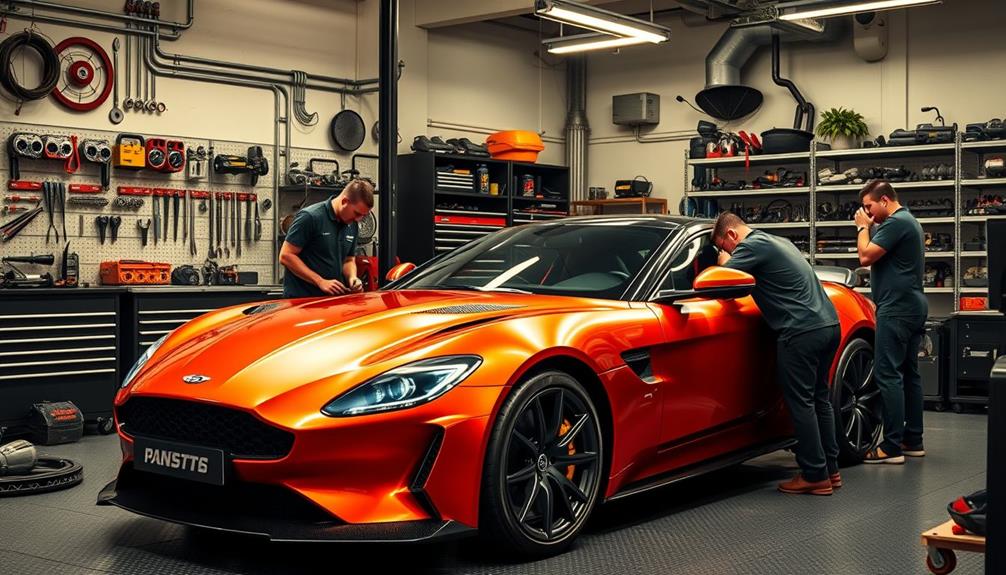
When searching for a reputable tuner, it's vital to regularly check online reviews and community feedback. This approach helps you gauge their reliability and the quality of service they provide.
Look for tuners who've a strong presence in car enthusiast forums, as these platforms often feature shared experiences that can guide you toward trustworthy mechanics.
Consider selecting an authorized dealer, as they typically have exclusive access to manufacturer ECUs, which can enhance your tuning process. This guarantees your vehicle remains compliant with warranty requirements while maximizing performance improvements.
Don't overlook the experience and expertise of the tuning shop; established tuners may charge higher prices, but they often deliver superior results.
It's wise to choose tuners who offer dyno testing before and after modifications, providing measurable data that validates the effectiveness of their work.
Frequently Asked Questions
How Much to Tune a Car in Singapore?
When you're considering tuning your car in Singapore, expect prices to start around S$500. Depending on the modifications and packages, costs can climb considerably, especially for extensive upgrades or additional performance enhancements. In addition to the initial cost of the tuning, it’s essential to factor in ongoing car tuneup pricing for maintenance and future modifications. Some shops may offer package deals or discounts for repeat customers, so it’s worth doing some research and comparing prices before making a decision. It’s also important to consider the reputation and expertise of the tuning shop, as well as the quality of their work, when determining the overall value of the service. If you’re looking for a car tuneup in the Philippines, prices can vary depending on the location and the type of service you’re looking for. It’s important to do your research and get quotes from multiple shops to ensure you’re getting the best value for your money. Keep in mind that ongoing car tuneup costs in the Philippines may also be influenced by the availability and cost of parts and labor. Ultimately, finding a reputable and reliable tuning shop that offers fair and transparent pricing is key to getting the best value for your car tuneup cost in Philippines.
How Much Does a Car Tune Usually Cost?
Think of your car as a musical instrument; tuning it adjusts the harmony. Generally, a car tune costs around S$500 for basic needs, but it can rise depending on your vehicle's unique requirements and modifications.
Is It Legal to Tune Your Car in Singapore?
Yes, it's legal to tune your car in Singapore, but you must comply with LTA regulations. Guarantee your modifications meet noise and emissions limits, and get approval for significant changes to avoid penalties.
How Much Does Stage 3 Tuning Cost?
When considering Stage 3 tuning, expect costs between S$1,500 and S$3,000. Additional hardware modifications and dyno testing can increase expenses, but some shops offer packages that bundle services for potential savings.
Conclusion
In the world of car tuning, you're not just customizing your ride; you're crafting your own automotive masterpiece, much like an artist with a blank canvas. Remember, while costs can vary, investing in quality tuning pays off in performance and enjoyment. So, whether you're chasing speed or style, choose wisely and find a reputable tuner who resonates with your vision. After all, your car deserves a touch of magic, just like every great story needs its hero.
